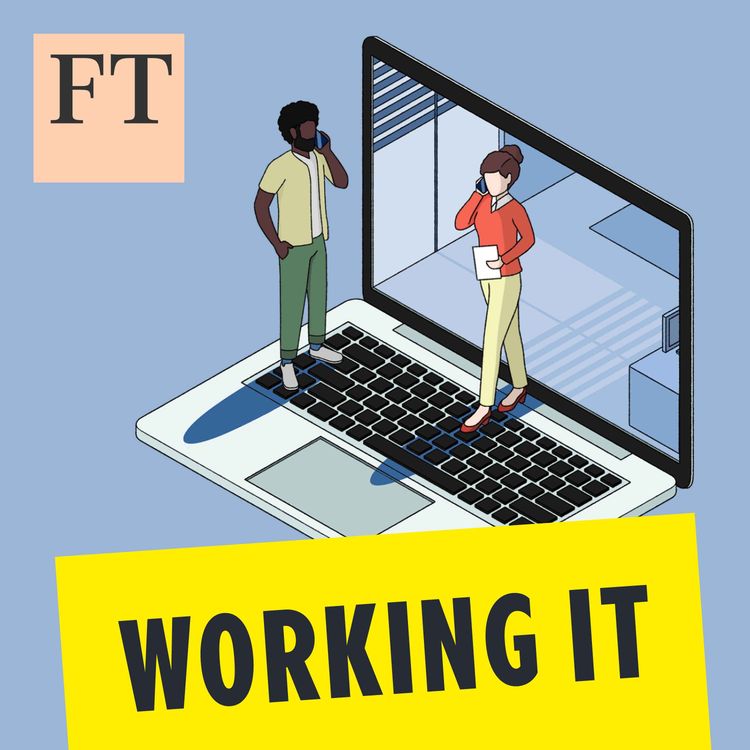Share

Working It
Working It live: How to get ahead without burning out
Leaders are always under pressure – but the most successful ones know how to manage it. In this special episode, recorded live at the FT Weekend Festival in London on September 7, Isabel Berwick speaks to psychologist Dr Audrey Tang, who explains how managers can better resist the pressures of their work. Tang, author of books including ‘The Leader’s Guide to Resilience,’ tells Isabel about the importance of bosses modelling healthy behaviour, why skills (as opposed to strengths) can make workers unhappy, and how to know when a colleague is about to burn out.
Want more? Free links:
The balance between idleness and burnout proves elusive
How to avoid burnout and thrive at work
Burnout and America’s great resignation: how employers can help
Presented by Isabel Berwick, produced by Mischa Frankl-Duval, mixed by Simon Panayi. The executive producer is Manuela Saragosa. Cheryl Brumley is the FT’s head of audio.
More episodes
View all episodes

100. Finale: How work has changed since we started this show
26:25||Season 2, Ep. 100After more than three years, and 153 episodes, this is the final Working It podcast. Isabel Berwick gathers three colleagues (and friends) to discuss what they’ve learned about the world of work since the show first launched. So please, if you will, join Isabel, Andrew Hill, Emma Jacobs and Anjli Raval in the kitchen for a slice of ‘Working It’ cake, and a heartfelt goodbye to the podcast.Subscribe to the Working It newsletter here.Presented by Isabel Berwick, produced by Mischa Frankl-Duval, mixed by Simon Panayi. The executive producer is Manuela Saragosa. Cheryl Brumley is the FT’s head of audio.Read a transcript of this episode on FT.com
99. Why being a CEO is so lonely (and how to fix that)
15:03||Season 2, Ep. 99Running a business is rewarding in plenty of ways – not least in terms of salary. But it can also be extremely lonely. Having friends at work becomes complicated (or even impossible), and you can’t be sure if people like you, or if they’re just saying what they think you want to hear. If you’re the boss, how can you learn to live with those downsides? To find out, Isabel Berwick speaks to Allan Barton (former MD of the waste disposal firm Shanks), and Tiffany Gaskell, co-CEO at the coaching consultancy Performance Consultants International.Subscribe to the Working It Newsletter here.Want more? Free links:Lonely bosses seek opportunity in a crisis of disconnectionIt feels lonelier at the top with everyone working from homeRead a transcript of this episode on FT.com
98. The science of better workplace conversations
17:41||Season 2, Ep. 98What can we learn about the way we speak by analysing thousands of everyday conversations? That’s a question that fascinates Alison Wood Brooks. Alison, an associate professor at Harvard Business School, and author of the forthcoming book, Talk: The Science of Conversation and the Art of Being Ourselves joins Isabel Berwick to discuss her research. She explains how to plan a conversation even when you don’t know who you’ll be speaking to, how we misunderstand apologies, and why there’s no such thing as too many questions.Want more? Free links:What we talk about when we talk about the officeThe difficult work conversation AI helped me withPresented by Isabel Berwick, produced by Mischa Frankl-Duval, mixed by Simon Panayi. The executive producer is Manuela Saragosa. Cheryl Brumley is the FT’s head of audio.Read a transcript of this episode on FT.com
97. Why are some bosses infuriating (and others inspiring)?
17:36||Season 2, Ep. 97When you’re a leader, colleagues look for hidden meanings in everything you do. That can make gentle suggestions sound infuriating – and amplify the effect of even off-hand compliments. So how can a leader make sure their words and actions are understood as intended? To find out, Isabel Berwick speaks to Adam Galinsky, a professor at Columbia Business School, and author of the forthcoming book ‘Inspire: The Universal Path for Leading Yourself and Others.’ Adam has asked tens of thousands of people about what makes a leader inspiring or infuriating. In this episode, he explains the perils of the ‘leadership amplification effect,’, how to praise colleagues judiciously, and why you should never tell someone to ‘drop by your office’.Want more? Free links:A Musk or a Ma: which type of manager are you?How common are bad bosses?Presented by Isabel Berwick, produced by Mischa Frankl-Duval, mixed by Simon Panayi. The executive producer is Manuela Saragosa. Cheryl Brumley is the FT’s head of audio.Read a transcript of this episode on FT.com
96. Best of: How to master the art of schmoozing
21:41||Season 2, Ep. 96This week's episode of Working It – the last of the year – is a repeat of one of our favourite episodes. It features a masterclass in chit-chat from Matt Abrahams, a lecturer in communications at Stanford University, podcast host, and author of the since published book Think Faster, Talk Smarter. Good conversation is an essential tool of self-promotion in the office. So what do we make of Matt’s advice here at the FT office? Host Isabel Berwick gets the views of award-winning FT columnist Pilita Clark and Stephen Bush, who writes the FT’s daily Inside Politics newsletter.Want more?Top ways to be a super schmoozerBig Tech is doing small talk no favoursWork etiquette: How to make small talk at a diplomatic functionFT subscriber? Sign up for the weekly Working It newsletter with one click here. We cover all things workplace and management — plus exclusive reporting on trends, tips and what’s coming next. Presented by Isabel Berwick. Produced by Laurence Knight and Audrey Tinline. The executive producer is Manuela Saragosa and the sound engineer is Simon Panayi.Read a transcript of this episode on FT.com
95. How to get ahead (without getting promoted)
15:48||Season 2, Ep. 95You thought you were getting that big promotion – but you missed out. What are your next steps? Isabel Berwick speaks to Sarah Ellis (co-founder of careers consultancy Amazing If) and FT Management Editor Anjli Raval to find out. They discuss how to keep your emotions in check after suffering professional rejection, who you should turn to for advice, and why ‘squiggly’ careers are more popular than ever.Want more? Free links:What can I do if I hit a career plateau?‘The flattening’: tech sector calls time on middle managersA big internal movePresented by Isabel Berwick, produced by Mischa Frankl-Duval, mixed by Simon Panayi. The executive producer is Manuela Saragosa. Cheryl Brumley is the FT’s head of audio.Read a transcript of this episode on FT.com
94. Best of: How to survive the office Christmas party
19:03||Season 2, Ep. 94It's the work Christmas party season: you're out of the office, and the alcohol is flowing. How can you make sure you don't embarrass yourself (or derail your career)? And how can you bounce back if you do go wrong? Isabel Berwick speaks to FT columnist and veteran party-goer Stephen Bush, author and comedian Viv Groskop and party-shy FT columnist Emma Jacobs to find out. Warning: contains drunken secret Santas, dancefloor embarrassment and toe-curling apologies.Got a Christmas party nightmare you’d like Isabel and Jonathan to help you with? Submit it here: https://telbee.io/channel/ygf7_gly04xgtckcb0g56a/ or to isabel.berwick@ft.comWant more? Free links:Workers and bosses opt for Christmas payments over partiesThe office grinch may have a point — it’s not fun if it’s forcedCredits:Presented by Isabel Berwick, produced by Mischa Frankl-Duval, mixed by Simon Panayi. The executive producer is Manuela Saragosa. Cheryl Brumley is the FT’s head of audio.Read a transcript of this episode on FT.com
93. How can middle-aged women get the most out of work?
19:42||Season 2, Ep. 93Many middle-aged women leave the workforce with plenty left to give. What can managers do to stop that from happening? Isabel Berwick speaks to Lucy Standing, founder of Brave Starts, a not-for-profit that helps older workers realise their potential. Isabel and Lucy are joined by writer and comedian Viv Groskop, who coaches and consults widely in the corporate world. Together, they discuss how women can ask the right questions about company culture, the factors you can’t fight at work, and why the last thing older workers want is another training course.Want more? Free links:The perils of overlooking women of a certain ageToo many women excel at their jobs but are ignored for top rolesAdvice to older workers: don’t be the office curmudgeonPresented by Isabel Berwick, produced by Mischa Frankl-Duval, mixed by Simon Panayi. The executive producer is Manuela Saragosa. Cheryl Brumley is the FT’s head of audio.Read a transcript of this episode on FT.com
92. Luck makes careers. Here’s how to get more of it.
17:59||Season 2, Ep. 92Most successful people will tell you that hard work and talent can get you where you want to go. Fewer of them will admit that luck is at least as important. Some of us are born into luckier circumstances than others; but we can all do more to make our own luck, and be ready to capitalise on it when the opportunity arises. In this episode, Isabel Berwick speaks to Tomas Chamorro-Premuzic, professor of business psychology at UCL and Columbia, chief innovation officer of ManpowerGroup, and author of books including ‘The Talent Delusion’ and ‘Why Do So Many Incompetent Men Become Leaders?’ Along with FT work and careers writer Emma Jacobs, they discuss why luck is a taboo subject, how it helps the wrong people thrive, and what managers can do to level the playing field.Want more? Free links:Why it’s often luck, not talent, that takes us to the topThe rich have advantages that money cannot buyThe untold career value of a little bit of luck at the outsetFT subscriber? Sign up to get Isabel’s free Working It newsletter in your inbox every Wednesday: ft.com/newslettersPresented by Isabel Berwick, produced by Mischa Frankl-Duval, mixed by Simon Panayi. The executive producer is Manuela Saragosa. Cheryl Brumley is the FT’s head of audio.Read a transcript of this episode on FT.com